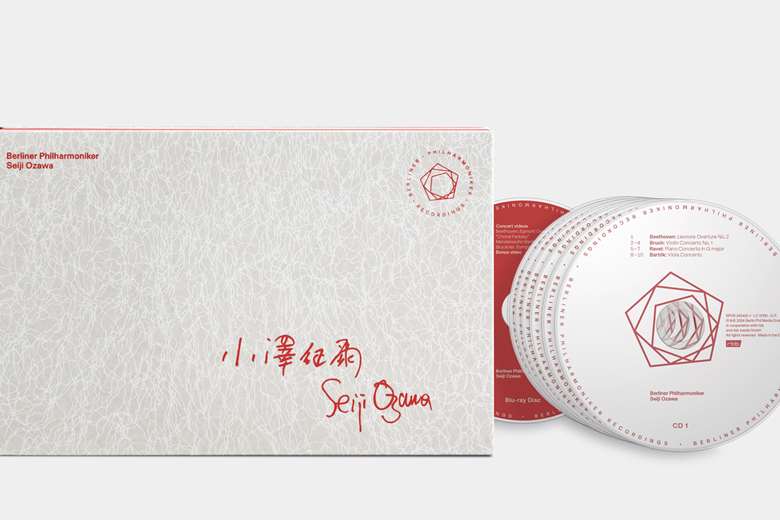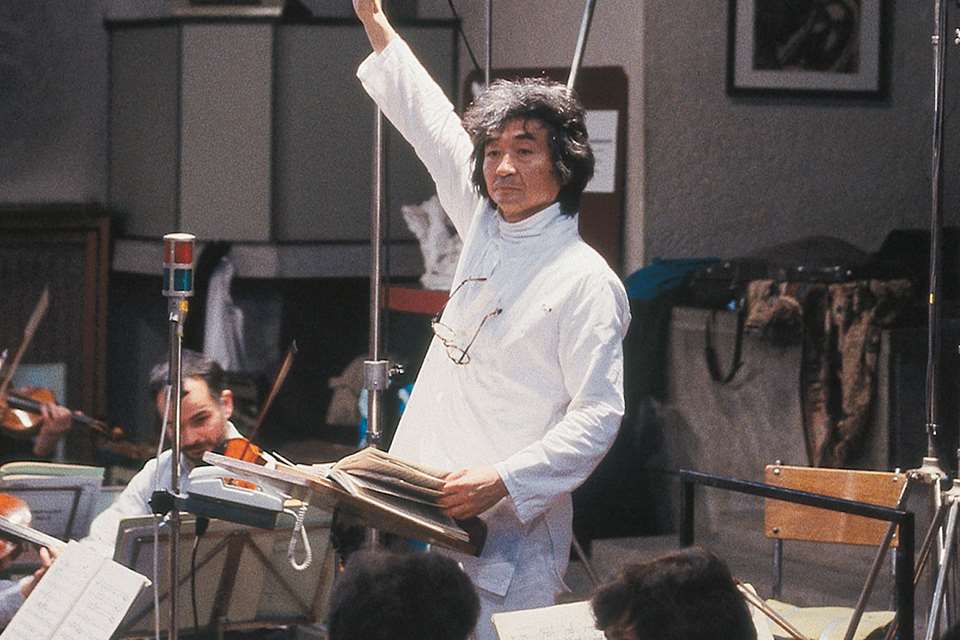Review - Berliner Philharmoniker and Seiji Ozawa: A Tribute
Andrew Farach-Colton
Friday, May 16, 2025
Andrew Farach-Colton enjoys a sumptuous set of the Japanese conductor’s recordings

Seiji Ozawa (1935-2024) first conducted the Berlin Philharmonic in 1966 in a programme hand-picked by his mentor, Herbert von Karajan. Over the next half a century, he directed the BPO in nearly 200 concerts, a generous handful of which are presented here in the orchestra’s latest celebratory box. As usual with BPO releases, the packaging is lavish: a rectangular box bound like a hardcover book opens to reveal an interior box on the left side containing six CDs and a Blu‑ray disc, while a lavishly illustrated booklet on the right offers discographic information and a series of essays, including one by Ozawa’s daughter and another by the acclaimed Japanese writer Haruki Murakami. Picture postcards of Ozawa are sprinkled throughout, and in a thoughtful touch, the interior is bright red, the maestro’s favourite colour.
Most of the recordings here come from the 1980s, when Ozawa was a guest with the orchestra several times a season. I’m not sure why a 1985 performance of Bruch’s G minor Violin Concerto was included. Pierre Amoyal plays well enough but it’s not a particularly illuminating example of Ozawa’s prowess as a collaborator. On the other hand, a thrilling 1982 reading of Ravel’s G major Concerto with Martha Argerich at her scintillating, spontaneous best is a real treat, and although there are a few places where she outpaces Ozawa, he elicits such piquant, rhythmically vital playing from the BPO that such minor lapses are easily overlooked. Similarly, while principal viola Wolfram Christ recorded Bartók’s Viola Concerto with Ozawa and the orchestra for DG, this concert version from 1988 is preferable for its added frisson.
One of the happiest surprises here is a playful 1987 performance of Haydn’s Symphony No 60, Il Distratto – the only example of Ozawa leading a Haydn symphony on disc, I believe. It’s big-band Haydn, yes, but stylishly vital and full of good humour. Tchaikovsky’s First Symphony, Winter Daydreams, is another highlight. With perfectly judged tempos, long-breathed lyricism and a memorable sense of atmosphere – those full-throated horns at the climax of the slow movement are magical – it’s a wholly satisfying interpretation.
Both Mahler’s First Symphony and Berlioz’s Symphonie fantastique were Ozawa specialities that he recorded several times. Admittedly, these concert performances – the Mahler from 1980, the Berlioz from 1982 – are marginally fresher and more propulsive than commercial counterparts, but they aren’t otherwise revelatory in any meaningful way. There’s also a Strauss Alpine Symphony from 1996 that’s quite a bit broader and more patient than his VPO recording yet no less vivid. The recording lacks presence in comparison with Philips’ demonstration-quality sound but is decent enough that one can wonder at the glowing, Klimt-like detail Ozawa conjures in the ‘Erscheinung’ section.
I certainly did not expect to find Hindemith’s Sinfonia serena here, and Ozawa makes the most of it. In fact, this 1987 performance has all the hallmarks of the conductor at his best: a consistent sense of forward motion so that every phrase seems to lead inevitably to the next, an overarching concern for colour and texture, and a sure sense of drama that’s leavened by a logical concern for structural integrity – the latter quality of the utmost importance in this score with its many feints and surprises. Those qualities are in evidence, too, in a taut yet eventful 2009 account of Bruckner’s First Symphony on the Blu‑ray disc. Peter Quantrill sang its praises in his appraisal of the BPO’s Bruckner box (audio only, 3/20), and I’m delighted they included it here with the video component as it’s an exemplar of how, especially in his later years, Ozawa produced glorious sounds with a striking economy of movement.
A 1988 performance of the Austrian composer’s Seventh Symphony (audio only) is even more impressive, perhaps. Ozawa allows the music to unfold with a rare naturalness, and while I’d never suggest that Bruckner is a composer whose music ‘plays itself’, that’s exactly the impression I have here. The Adagio is spellbinding, seeming to unfold as if in a single breath, and he propels the finale with invigorating rhythmic energy. Unfortunately, there are some subtle yet irritating hiss-like noises on the recording in loud passages, but the music-making is so exceptional that I’m grateful the BPO decided to include it anyway. Ozawa often excelled in late Romantic repertoire, of course, and the last CD concludes with a searingly intense reading from 1979 of the Tristan Prelude and Liebestod. Even the silences at the opening of the Prelude crackle with electricity.
The DVD also offers a sober yet warm‑hearted performance of Mendelssohn’s Elijah (or Elias, in this case) from 2009, featuring Annette Dasch, Nathalie Stutzmann, Anthony Dean Griffey and the marvellous Matthias Goerne. As usual, Ozawa conducts this vast work from memory, and if it’s not the most arrestingly characterful interpretation, it’s beautiful nonetheless. Honestly, though, I was considerably more moved by two of Ozawa’s final performances with the BPO, both from 2016: an Egmont Overture of darkly solemn power and a Choral Fantasy where, in its intimate moments, Ozawa, Peter Serkin and the orchestra seem to be making chamber music together. Finally, there’s a brief, informal ceremony in which the conductor is made an honorary member of the BPO. It’s a lovely memento of the respect and affection the orchestra clearly felt for their frequent collaborator, and it’s clear from Ozawa’s boyish, misty-eyed response that those feelings were very much reciprocated.
The recordings
Berliner Philharmoniker and Seiji Ozawa: A Tribute (Berliner Philharmoniker)










